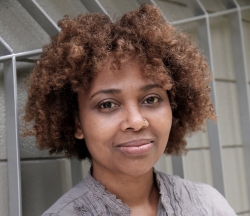CHICAGO: American Blues Theater has named Inda Craig-Galván the recipient of its national 2018 Blue Ink Playwriting Award, which recognizes an unpublished full-length play. Craig-Galván’s Welcome to Matteson! was selected from a pool of 606 worldwide submissions. She will receive a $1,000 cash prize and the opportunity to further develop her script with American Blues Theater.

“We’re so excited to announce Inda Craig-Galván’s script as the 2018 winner,” said artistic director Gwendolyn Whiteside in a statement. “Inda is an exciting voice in American theatre. Her dark comedy will have audiences laughing one moment and sitting in shocked silence the next. Her work is vulnerable, truthful, and provocative—qualities that are certain to give this play a place in the American canon.”
Welcome to Matteson! is a dark, intra-racial comedy about a suburban couple who host a welcome party for their new neighbors—a couple forced to relocate from Chicago’s Cabrini-Green housing project.
Craig-Galván’s play Black Super Hero Magic Mama was developed at the 2017 Eugene O’Neill National Playwrights Conference. Her plays have been workshopped at the Oregon Shakespeare Festival Black Swan Lab, Seattle’s Intiman Theatre, New Pages Lab at the Playwrights’ Arena in Los Angeles, and San Francisco Playhouse. She received the Kennedy Center Rosa Parks Playwriting Award, the Jane Chambers Student Playwriting Award, and was the runner-up for the Princess Grace Award. Her works have also appeared on the Kilroys List. She received her MFA in dramatic writing from the University of Southern California’s School of Dramatic Arts.
“I am incredibly honored to have my work selected by American Blues Theater,” said Craig-Galván in a statement. “Being able to ‘emerge’ as a playwright in the city I grew up in is, of course, a great feeling. And to be here with this play that is so steeped in the politics and complexities of this town makes it even more special. I lived in the South Suburbs during the time when this play takes place. I witnessed what these characters are dealing with. I want to dramatize that—those fears and this weird sense of reverse gentrification—in a way that displays the extreme good alongside the extreme loathsomeness that’s inside all of us. I’m excited to continue exploring these couples as they discover their changing meaning of home.”

